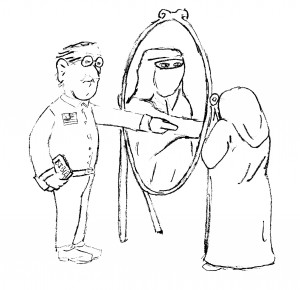SPIRITUAL REFLECTION
Sunday March 23rd 2014, 4:08 am
Filed under:
Religion

This post draws from the ideas in Chapter 2 of Professor Asani’s Infidel of Love: Exploring Muslim Understandings of Islam. Asani references American attitudes toward Islam in both sympathetic and antagonistic terms to highlight the misunderstandings that have arisen among outsiders. Consequently, he takes on the task of defining Islamic values and ideals, which he identifies as “peace and compassion, social justice, selfless love of God, and jihad,” in order to illuminate some ideas on the compatibility between religion and nation.
Americans can arguably find it easy to identify with at least some of the values identified by Asani, particularly peace and compassion, and social justice, regardless of whether they identify as Christian (the dominant religion in America). Meanwhile, their response towards the ideals of selfless love of God and jihad may be slightly farther from the American point of view. Nevertheless, even jihad as a term of describing group or inner struggle is not very far from the secular American understanding, nor Christianity, which contains teachings on inner struggle. As such, my post is a drawing of a stereotypical “American” and Christian man talking to a Muslim woman. Their conversation is devoid of content, but the man is pointing his finger at the woman accusatorily. Meanwhile, the man is oblivious to a mirror next to him that depicts him as a Muslim woman. The drawing is meant to show that, while the Muslim woman may look and express herself differently, her values are not far from his values, thereby emphasizing their similarities.
Varieties of Islam
Sunday March 23rd 2014, 3:23 am
Filed under:
ReligionISLAM
The beloved Prophet Our blessed Messenger Greatest of Prophets
Who brought us the Word Showed us the way Elucidated the mysteries
Beneath the desert sun From the humble ground Within the shaded forest
To deliver us to the Almighty To Heaven Of the divine purpose,
Alhamdulillah! Praise be to Allah Allahu Akbar
In peace we may forever lie. Your Word is our command. I submit to thee.
The chosen one, Muhammad
Conduit of God,
Delivered from Mecca
His sacred plan
in His holy name
I surrender.
Professor Asani writes: “The story of Islam is not one story but many stories involving peoples of many different races, ethnicities, and cultures, professing conflicting interpretations. To acquire a correctly nuanced understanding of Islam and its role in Muslim societies, crucial questions one should ask include: Which Islam? Whose Islam? In which context?” Professor Asani’s contextual/cultural approach discussed during the first lecture recognizes the idea that Islam is not one monolithic, all-encompassing idea. By bringing every person and organization under the term Islam, there are almost necessarily inconsistencies that arise within the term. While some may call these “contradictions”, as different people who claim to be Muslims have opposing interpretations of the Quran and expressions for their beliefs, these differences are directed and/or rooted in the same belief system.
My poem seeks to explore the idea of the “varieties” of Islam. The poem is titled “Islam” and its verses are in praise of Muhammad, inspired by the Sindhi and Urdu poems of week 4. The structure consists of four stanzas, which can be seen as four different poems, set horizontally to emphasize their juxtaposition to one another. While each stanza uses different words, the themes and ideas are very similar. (For example, some words, such as “Muhammad” and “Prophet” are used in the same horizontally adjacent line.) Notably, the poem also evokes different settings, such as the forest and Mecca. The effect is that the reader can see that each stanza says essentially the same thing in a different way. While I don’t attempt to resolve the debate regarding the contradictions inherent in the Islamic faith, I do seek to emphasize the idea of unity in Islam without disregarding differences in interpretation and practice.
Zakat
Sunday March 23rd 2014, 12:46 am
Filed under:
ReligionZakat
My first post is a short animated clip exploring the concept of Zakat. The inspiration for the animation came from Aminata Sow Fall’s novel The Beggars’ Strike, or, The Dregs of Society. The story is set in a Muslim community somewhere in Africa, where beggars are being driven away by the wealthier and more powerful members of the community. However, the same people that are driving away the beggars are required by their religion to give alms to beggars and the poor. When Ndiaye, the main antagonist towards the beggars, realizes he needs to give alms to the beggars so that he can receive God’s blessing, the beggars refuse to return to the city. And without beggars, the rest of the Muslim community is without people to give alms to. Hence they are unable to receive their prayers or religious obligation of Zakat.
In the clip, you can see a division between the healthy land filled with grass and the impoverished land with dry, cracked soil. When coins fall onto both the impoverished soil and the green land, only the coins on the cracked soil produce a crop of wheat! The movie finishes with a quote from the Quran that states that money is like a seed of grain and God will multiply the wheat depending on how it is sowed. I incorporate the main theme of The Beggar’s Strike with this quote of the Quran to develop an animated interpretation of Zakat,
